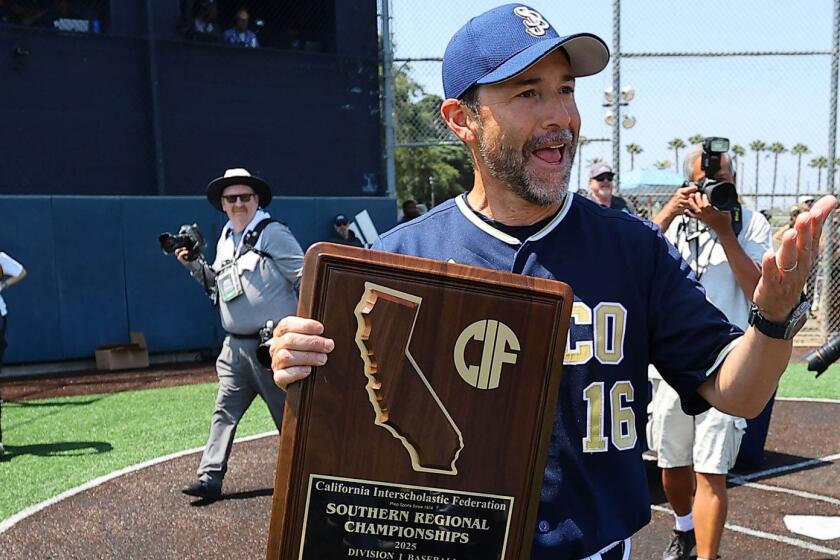Tennant Put in Limbo : Pro football: NFL commissioner says he cannot confirm that the West Covina doctor will continue to be the league’s drug adviser.
- Share via
NEW ORLEANS — The drug story that won’t go away didn’t. In fact, after Commissioner Paul Tagliabue’s first Super Bowl news conference Friday, the speculation was that it will be Dr. Forest Tennant who goes away.
Tennant, of West Covina, has been the chief adviser for the National Football League’s drug-testing program since it began in 1986. Wednesday night, a Washington television station broadcast a story that strongly questioned both Tennant and the NFL for procedures and motives in the drug-testing program.
That story, which became the focus Thursday of intense media attention, and which was generally found to be lacking in specific information, nevertheless seems to have placed Tennant in a bad light. That became increasingly clear as Tagliabue, stepping to the podium in his rookie appearance as Pete Rozelle’s successor, fielded question after question challenging Tennant’s credibility.
Four areas seemed to give Tagliabue pause. They were that:
--Tennant was filmed by the Washington station making a racist statement about minorities wanting to work.
--Tennant was characterized by one questioner as a man who advertised for sale a so-called “cocaine cure kit.”
--Tennant was quoted as having said at one time that “counseling for serious addicts is useless.”
--Tennant was characterized by another questioner as engaging in double billing.
To the first question, Tagliabue answered: “Yes, I saw that portion of the film clip, and, while I do not think it was a proper characterization on Dr. Tennant’s part, it does not say anything at all about the legitimacy of our drug-testing program.”
To the second question, concerning the “cocaine cure kit,” Tagliabue answered: “I am not aware of this.”
To the third question, that “counseling for serious addicts is useless,” Tagliabue said: “I did hear Dr. Tennant say that, and I was mystified. I do want to talk to him about that and some other things.”
And to the question of double billing, Tagliabue responded: “That is, once again, on the issue of the credibility of Dr. Tennant. And that should be addressed by saying that reports of that were in Sports Illustrated months ago, and that Dr. Tennant’s records are at odds with what that says.”
Generally, Tagliabue’s defense for the NFL side of the issue of the Washington TV story was a strong offense. He used terms such as “smear tactics” and “gross distortion,” and called the reporting “a journalistic Molotov cocktail.” He also decried the unfairness of putting players such as Joe Montana and John Elway under such intense additional pressure during a Super Bowl week with accusations that merely referred to “white quarterbacks.”
“The whole thing is just so grossly unfair,” Tagliabue said.
But on Tennant, his offense was a bit more defensive. When asked if he could give Tennant a vote of confidence for his job security in 1990, Tagliabue said: “I cannot confirm that he will be our drug adviser; nor can I confirm that Joe Browne (his popular director of communications) will be my spokesperson next year. All NFL positions are constantly subject to review.”
Tagliabue added that among the things he was attempting to do in the NFL drug program was to involve minority doctors.
Tennant responded to the events of the last two days through a press release issued Friday afternoon and signed by the president, Lawrence F. Cole, and vice president, Ross Figgins, of Tennant’s firm, Community Health Projects Inc., of West Covina. The release read:
“Community Health Projects Inc., is a large nonprofit corporation which operates medical and drug clinics throughout Southern California. Dr. Forest Tennant is our executive director and we have encouraged him to participate as the NFL’s drug adviser on a part-time basis since 1986. We emphatically deny the allegations concerning our involvement with the NFL drug program as stated by the local ABC affiliate in Washington, D.C. We are currently considering our legal response and, on the advice of counsel, do not feel it appropriate to discuss these matters, especially since Gordon Griffith is the subject of a related criminal trial to begin in Los Angeles on Feb. 5, 1990. Further, we assert that the allegations of wrongdoing presented by the ABC affiliate’s broadcast are untrue.”
A former employee of CHP Inc., Griffith allegedly was fired by Tennant and is involved in a legal case with Tennant involving a payroll dispute. Griffith is also the main source of the Washington TV station’s story, and was paid by Sports Illustrated for a story it did last year on Tennant and problems with the NFL’s drug-testing program. Griffith also allegedly sought money from ESPN in exchange for information that would lead to a story, and he has called The Los Angeles Times frequently with story suggestions about Tennant and the NFL.
Away from the issue of drug-testing and Tennant, Tagliabue touched on:
--His three-pronged plan to deal with what he called the “opportunities of the ‘90s” that included developing a healthier relationship between ownership and players; expanding TV coverage, and looking at international expansion of pro football.
--His opinion that the steroid problem is a potentially more damaging issue than that of street drugs. “I see this as the most serious problem we have in the NFL. Steroids do three things: give a competitive edge, enhance performance and put pressure on other players to use them. These things are directly related to our product on the field, and we will deal very emphatically with users.”
--His general dislike of the taunting and showboating tactics of some players. “I thought it was so refreshing when Flipper Anderson caught that touchdown pass against the Giants and kept right on running. The New York Times speculated that he spiked the ball in the shower. Well, that’s where I like spikes.”
--His empathy for Al Davis and the Raiders in their stadium search. “The Los Angeles Coliseum is not an adequate stadium for our games.”
--His dislike of the trend toward longer and longer games. “One of the problems is disparity. We have 2-hour 50-minute games, and then we have four-hour games. We will present a package deal with length of game and pace of game part of the consideration.”
--His apparent desire to keep instant replay. “The fans like it a lot, even though none of us like those delays. We hope to make modifications to it, and keep the instant replay, rather than throwing it out.”
--His new approach to pursuing expansion, which is to have ground rules set by an NFL Committee of the Whole, rather than throwing the issue directly to an expansion committee, as in the past.
He also appeared to take a pro-owner stance with a statement that undoubtedly was heard with great interest by officials of the currently struggling NFL Players Assn.
When asked about the union, which recently was decertified and currently appears to be in a kind of limbo, Tagliabue said the union had “committed organizational hara-kiri.”
More to Read
Go beyond the scoreboard
Get the latest on L.A.'s teams in the daily Sports Report newsletter.
You may occasionally receive promotional content from the Los Angeles Times.











